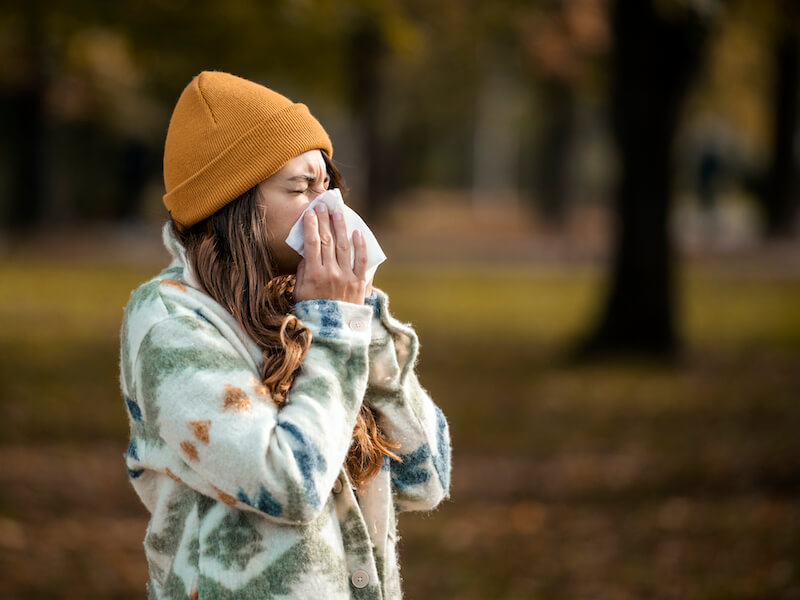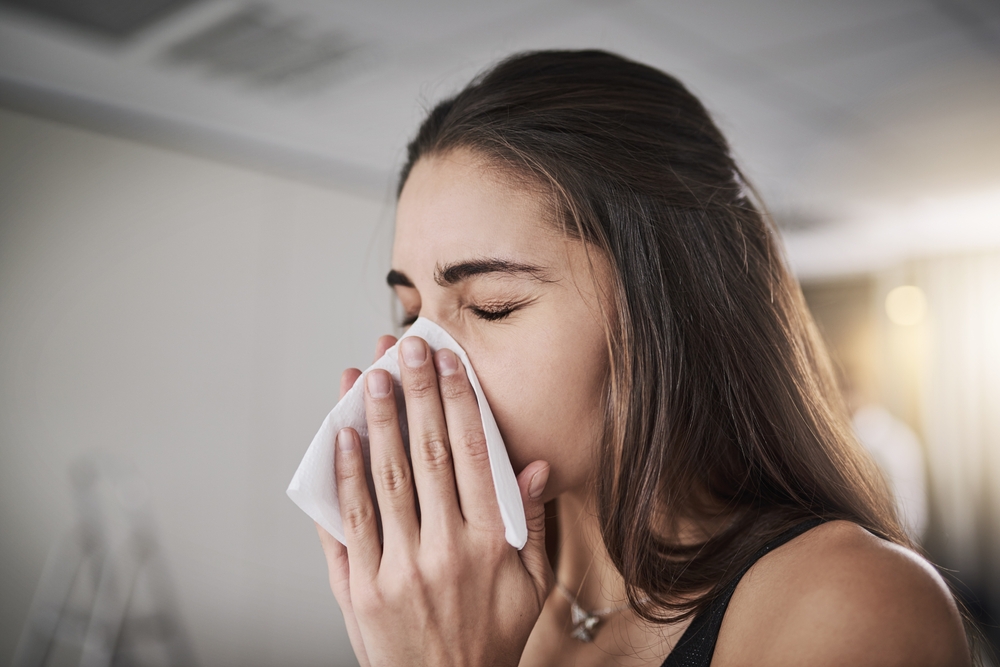You know those classic cold symptoms? Sneezing, runny noses, fevers–that kind of thing. Turns out, most of these symptoms are not caused by the cold virus itself. Instead, these symptoms are a by-product of your immune response. Funny though it may sound, a fever is just one tool in your body’s toolbox, designed to protect you from viruses and bacteria.
Your immune system is pretty great! It keeps you healthy when you would otherwise be overrun by germs. We’re big fans! But your immune system doesn’t always get things 100% right. Sometimes all those antibodies see something harmless and mistake it for a viral invader.
People can be allergic to all kinds of things: dust, cats, peanuts, root beer–you name it. Environmental allergies, in particular, can cause symptoms closely associated with the common cold: sniffling, sneezing, headaches, and more. Environmental allergies are usually breathed in–they’re part of your environment (hence the name), making them extra challenging to avoid. Over time, this can cause havoc with your sinuses (not to mention your peace of mind).
Symptoms of seasonal allergies
Allergic reactions occur when your immune system identifies something otherwise harmless as a threat to your health. Whether that’s mold or pollen or cat dander, your immune system will then fire up its defenses. For most people, this will result in some of those hallmark symptoms. The most common include the following:
- Stuffy nose
- Coughing
- Sneezing
- Postnasal drip
- Dark circles under your eyes
- Coughing and wheezing
- An itchy nose
- Eyes that are itchy or red or watery
- Feeling tired all the time
- Hives
As you can see, the symptoms can be extensive. These symptoms can also vary considerably from person to person. Your friend Susan may sneeze when around cats; your pal Bruce might start coughing. (That said, some of these symptoms are certainly more common than others–and sneezing is a stereotypical allergy symptom for a reason!)
Causes of allergy symptoms
Environmental allergies can be caused by a wide variety of substances–medical professionals tend to call them “allergens.” Common allergens include the following:
- Pollen: This is a huge contributor to seasonal allergies. Trees, grasses, and weeds all release these microspores on a seasonal basis. They’re absolutely harmless–unless you’re allergic to them. Many pollens are pretty local, traveling only a small distance. But some pollen types can catch a ride on air currents and travel for miles. Which means you could have a pollen allergy even if there’s nothing green in sight.
- Dust: Most homes have more dust than you would think. In many cases, this dust can either itself cause or carry other allergens that can cause allergic reactions. It’s a good reason to keep your house clean!
- Pet dander: It’s not typically the fur on your dog or cat that causes your allergic reactions: it’s their dander. (Especially because the dander can very easily get into the air.) If you’re allergic, pet dander can cause sniffing, sneezing, and all those other symptoms, too.
- Dust mites: Dust mites are tiny little critters that consume dust. Typically, they’re harmless. But when they cause allergic reactions, it means you can find yourself with itchy eyes or a runny nose–or even wheezing.
These are just some of the environmental allergens out there. And many of these categories can break down even further (just because you’re allergic to oak tree pollen doesn’t mean you’ll have a reaction to pine tree pollen, for example).
How do I know if I have allergies?
So, you might have a hunch about what you’re allergic to. But the only way to be sure is to get tested by your doctor. An allergy diagnosis can be accomplished in a couple of ways. The two most common are:
- Blood testing: Your provider will look for certain markers in your blood that indicate an allergic response.
- Pin prick test: Your doctor will lightly prick your skin with suspected allergens and watch to see if there’s a reaction! This is usually the most reliable way to see if you’re allergic to something. (It can lead to some itching, but that’s a normal part of the test.)
Getting an official diagnosis will always require a visit to your provider! And best of all, you’ll always know exactly what you’re allergic to.
How to treat allergies
Unfortunately, allergic reactions are not really something that can be cured. But there are three basic approaches to treating them.
Prevention
If you can minimize your exposure to triggers and allergens, you may be able to prevent the onset of symptoms. Inside, this means keeping the air clean, keeping mold in check, and vacuuming often (especially if pet dander is an issue). Also, consider brushing your pets often and being careful about how you dry clothes (an indoor drying solution is better than an outdoor one).
Outdoors, this means checking the pollen count before you plan activities–and wearing a mask if necessary. Pollen counts are often lowest in the early morning and late evening, so plan your activities around those times.
Short term treatment
Managing symptoms can sometimes be accomplished with the use of short term medications, such as antihistamines. These are medications you can take when your symptoms flare up and, hopefully, you’ll be able to achieve a certain amount of relief.
These medications are typically short term–they’ll get you through a day or a week, but most people don’t like to be on them for months or years at a time.
Long term treatment
One of the most successful long term treatment options is something called immunotherapy. If you’re allergic to cat dander, for example, your provider will expose you to a special formulation that contains a tiny amount of cat dander.
It’s not enough to cause a reaction. But it is enough to start getting your immune system accustomed to the allergen. Each subsequent injection then will contain slightly more of the allergen. Over time, this approach can effectively desensitize your immune system.
Positive results from this treatment may take several months to accomplish. But once your body is desensitized to that allergen, you can be symptom free for years–or longer. Immunotherapy is available in the form of allergy shots, liquid drops, or tablets.
You don’t have to suffer with allergies
If you have environmental allergies, there are likely some times of the year in which you find yourself with a “cold” that just won’t go away. Guess what? It’s not a cold! Environmental allergies can be particularly troublesome because they’re so prevalent–they’re hard to escape.
But just because you have environmental allergies doesn’t mean you need to be miserable. After all, repeated allergy symptoms can lead to sinus infections–or repeated sinus infections. The best way to avoid all that is to make sure you’re managing your allergy symptoms as best you can.
After all, just because you have allergies doesn’t mean you have to be miserable.
Want relief from environmental allergies? Find a provider near you!



